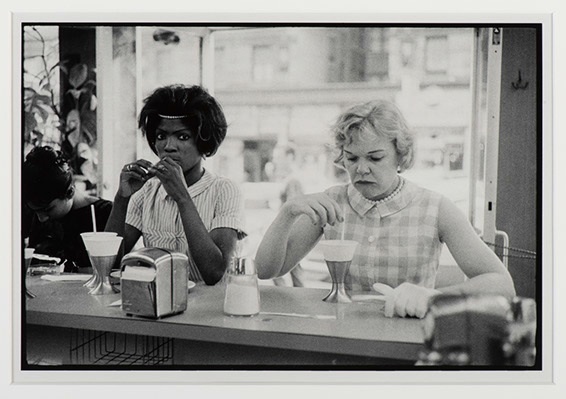Next month, the Museum of Art in Fort Lauderdale is opening a temporary exhibition which will present the photography collection of Martin Z. Margulies. From the pictures that have surfaced online, this appears to be a stunning sample of 20th America, from the early 30’s to this day, from one coast to another:
 Photo by Dorothea Lange
Photo by Dorothea Lange
 Photo by Bruce Wilson
Photo by Bruce Wilson
Historical American photography is one of my personal favorite and History only gets better when it is told through the stories of common places and people. I keep my fingers crossed that this exhibition ends up traveling to the various places it documents.
If you’re not already familiar with the works of Shanley, then the release of her latest book is probably a good and comprehensive way to get a feel for it.
Your Startup is Broken is a set of essays that each attempt to deconstruct and criticize the organizational and social flaws of companies in the tech industry and specifically the smaller ones.
The first 100 pages are essentially trying to address issues that are common to most companies, but that the typical startup environment – scruffy, fast, monocultural – tends to either exacerbate or ignore. The meat of the book is the section that gathers essays around the topic of misogyny and sexism – something that permeates our entire society but whose manifestation in the industry is highly visible.
If you’re already familiar with those problematics, the book is probably not going to be an eye-opener. If you’re not, then you might be in for a rough ride. The words can be harsh but what’s harsher is the ring of truth behind them:
And then there is Lean In, the new brand of white, extreme upper-class tech feminism championed by Sheryl Sandberg and epitomized by Marissa Mayer. It is a self-interested feminism of white privilege, bereft of historical context, bereft of critical thought. It is a feminism removed utterly from the challenges of average women workers in tech, a feminism deliberately pacified for the devouring palate of the status quo.
It is, at last, a feminism the patriarchy can get behind.
Certain articles definitely exposed patterns in a way that I hadn’t picked upon before, or shed light onto something I ignored because of my own history. Regardless of your own perspective and opinions, the book certainly offers a whole lot of food for thought, which is well worth $10.
The adaptation of Gone Girl is finally out and the quest for a real 2014 grown-up movie is finally over. I’m not big on reading fiction novels, but I very much enjoyed Gone Girl and have been impatiently awaiting the release of the motion picture.
I have to admit being a little disappointed – while Ben Affleck manages to give life to the character of Nick Dunne, Rosamund Pike’s performance is well below what I was expecting. Amy is lacking a lot of substance and credibility – people in the audience laughed at what should have been the most dramatic scene of the movie.
Some aspects of the book are fairly well rendered – the love progressively dying between Amy and Nick, the ambiguity of Nick’s character – while others seem to have just been dismissed, if only to fit into a screenplay that ends up being shallower than the book. So, go read the book instead.
As far as grown-up drama movies go, Gone Girl is good, but it is lagging well behind its 2013 predecessor: Prisoners
 Photo by Dorothea Lange
Photo by Dorothea Lange Photo by Bruce Wilson
Photo by Bruce Wilson